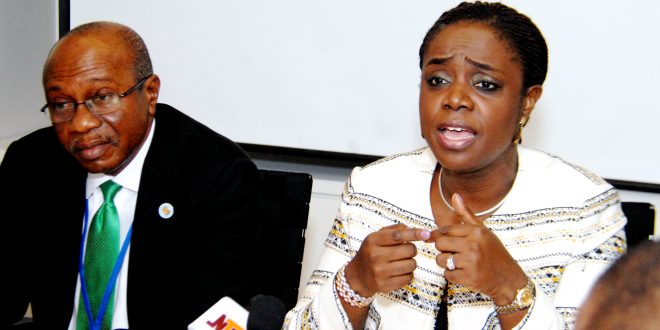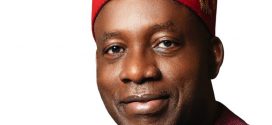…Says Nigeria’s debt to GDP ratio is within a reasonable threshold
The Honourable Minister of Finance, Mrs. Kemi Adeosun, on Wednesday, revealed that the Federal Government would apply the sum of US$3 billion in refinancing the legacy debts of the immediate past government.
The outlay is part of the US$5.5 billion foreign loan being sourced from the International Financial Markets.
The Minister, who appeared on Arise TV’s News Programme, said the proposed $5.5 billion loan was made up of two components – refinancing of heritage debts to the tune of $3billion and new borrowing of $2.5 billion for the 2017 Budget.
She said, “Let me explain the $5.5 billion borrowing because there have been some misrepresentations in the media in the last few weeks. The first component of $2.5 billion, represents new external borrowing provided for in the 2017 Appropriation Act to part finance the deficit in that Budget.
“The borrowing will enable the country to bridge the gap in the 2017 budget currently facing liquidity problem to finance some capital projects.
“For the second component, we are refinancing existing domestic debt with the US$3 billion external borrowing. This is purely a portfolio restructuring activity that will not result in any increase in the public debt,” she disclosed.
Adeosun further noted that the country’s debt puzzlingly rose from N7.9 trillion in June 2013 to N12.1 trillion in June 2015, despite the fact that only 10 per cent of the budget was allocated to capital expenditure when oil price exceeded $120 per barrel.
She emphasized the President Muhammadu Buhari-led Administration was investing in critical infrastructural projects such as roads, rails and power in order to deliver a fundamental structural change to the economy that would reduce the nation’s exposure to crude oil.
“Under this dispensation, we are not borrowing to pay salaries. If all we do is to pay salaries, we cannot grow the economy. This Administration is also assiduously working to return Nigeria to a stable economic footing. In light of this, the Government adopted an expansionary fiscal policy with an enlarged budget that will be funded in the short term, by borrowing,” Adeosun stated.
She reassured that the US$5.5 billion foreign borrowing was consistent with Nigeria’s Debt Management Strategy, whose main objective was to increase external financing with a view to rebalancing the public debt portfolio in favour of long-term external financing.
“Nigeria’s debt to Gross Domestic Product (GDP) currently stands at 17.76% and compares favourably to all its peers. The debt to GDP ratio for Ghana is 67.5%, Egypt is 92.3%, South Africa (52%), Germany (68.3%) and United Kingdom (89.3%).
“Nigeria’s debt to GDP ratio is still within a reasonable threshold. This Administration will continue to pursue a prudent debt strategy that is tied to gross capital formation. This will be attained by driving capital expenditure in our ailing infrastructure which will in turn, unlock productivity and create the much-needed jobs and growth,” the Minister added.
 Hottestgistnaija.com
Hottestgistnaija.com





